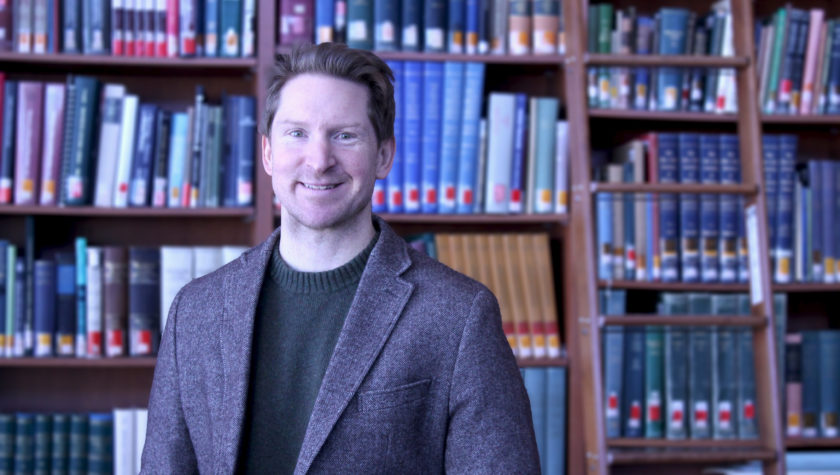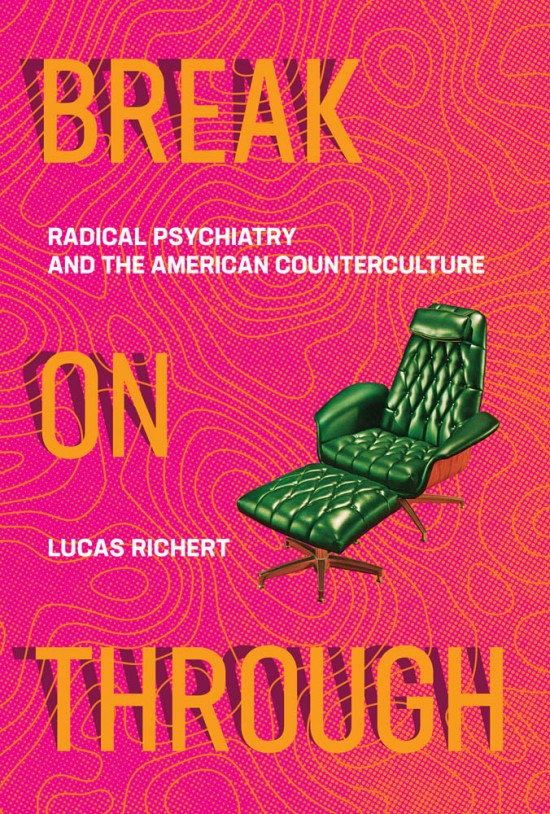
4
December

Associate Professor Lucas Richert’s new book examines the radical ideas and therapies induced by ‘outsiders’ in the 1960s and ‘70s
By Mary Magnuson
The 1960s and ‘70s were a time of political and cultural tumult. And the medical field — particularly mental health and psychiatry — was not immune to the revolutionary social, economic, and political movements that marked the era.
Medical historian Lucas Richert, associate professor in the University of Wisconsin–Madison School of Pharmacy’s Social and Administrative Sciences Division, was fascinated by the impact of this era of radical thought on mental health practices. This October, he published his third book, called Break on Through, as an exploration of the counterculture and history behind psychiatry and the introduction of cannabis and psychedelic drugs like LSD and MDMA into treatment.
The release comes on the heels of Richert’s second book, Strange Trips: Science, Culture, and the Regulation of Drugs, which is an examination of the fluid nature of legitimate and illegitimate drugs that was released in February 2019.
As Richert explains in Break on Through, many of the changes felt in the mental health field were at the demands of the “Radical Caucus” — a group of psychiatrists who led an “antipsychiatry” movement that blamed the effects of social forces such as capitalism, racism, and sexism for the bulk of mental health issues, spring boarding off controversy caused by the Vietnam War. At the same time, the Radical Caucus sought to dismantle the American Psychiatric Association, which they felt was complicit in social oppression.
“This is necessary but not sufficient if the American people are to build a new mental health system within a new health system which is community controlled, without cost to the recipient and engaged in liberating rather than imprisoning people,” wrote Paul Lowinger, a doctor and activist affiliated with the Radical Caucus.
“People in power, either medical authorities or policymakers, have big challenges ahead and my book helps frame how these challenges were dealt with in the not-too-distant past.”
—Lucas Richert
“I loved the concept of telling an ‘outsider’ history — or, at least, how outsiders in mental medicine worked within and against the system,” Richert said. “It started with a few choice gems found in the archives.”
As the George Urdang Chair in the History of Pharmacy, a position that places him as historical director of the American Institute of the History of Pharmacy (AIHP), Richert conducts interdisciplinary research on historical pharmaceutical topics to understand more about how current issues came to be.
Richert says many of the same debates about mental health struggles today happened 50 years ago, as drugs like marijuana and LSD are again resurfacing as potential therapeutic agents and providers look for new strategies to deal with rising rates of anxiety and depression. With Break on Through, he hopes to provide context for these issues and demonstrate how the medical field navigated them in the past, and what successes and failures ensued.
“People in power, either medical authorities or policymakers, have big challenges ahead and my book helps frame how these challenges were dealt with in the not-too-distant past,” Richert said.
Richert’s main goal with Break on Through was to tell an enticing story and expand on the already existing research the topic held. But as he developed the story, he widened his scope from focusing specifically on the Radical Caucus to incorporating other elements of alternative psychiatry — like parapsychology, the emergence of the Church of Scientology, and alternative therapies.
“My approach started to evolve over time. I decided that it was crucial to provide multiple stories about psychiatry, the American mind, and the 1960s and 1970s as a distinct era,” Richert said. “I started drifting away from the narrow story and I’m happy to say my editors at The MIT Press were supportive.”

He started the research process in 2008, while living in London, when a grant application to travel to the University of Pennsylvania archives, where he found his initial angle for the book in letters from the American Psychiatry Association, failed. But a call with a colleague allowed him to talk through the project even without visiting the archives and cemented his commitment to telling the story of social and psychiatric upheaval. He eventually made it out to the archives and began slowly piecing together his research until 2017.
Richert says his relationship with other researchers in the School of Pharmacy allowed his project to thrive, specifically Associate Professor Michelle Chui and Professor Dave Mott (BS ’88, MS ’92, PhD ’95), vice chair and chair of the Social and Administrative Sciences Division, respectively. They helped provide “both intellectual and material support,” according to Richert, “as well as some good laughs in the hallway.”
“There’s a lot of people to thank, to be honest,” Richert said. “It takes a large village of helpful friends and supportive organizations, including the School of Pharmacy, AIHP, the American Association of the History of Medicine, the Canadian Society of the History of Medicine, and many others.”
Despite releasing two books in 2019, Richert is already back in the trenches working on his next book, about the history of cannabis production across different countries and cultures, which is slated for release in early 2021. To represent varied perspectives, the book will be a collection of chapters from people all round the world.
“We all know a lot about cannabis here in the United States and maybe Canada or Mexico,” Richert said. “But I want to make sure that as this drug becomes the focus of national debates around legality and safety, readers, scholars, and policymakers have a grasp of the wider picture — in various places, including Afghanistan, South Africa, Iran, and Germany.




